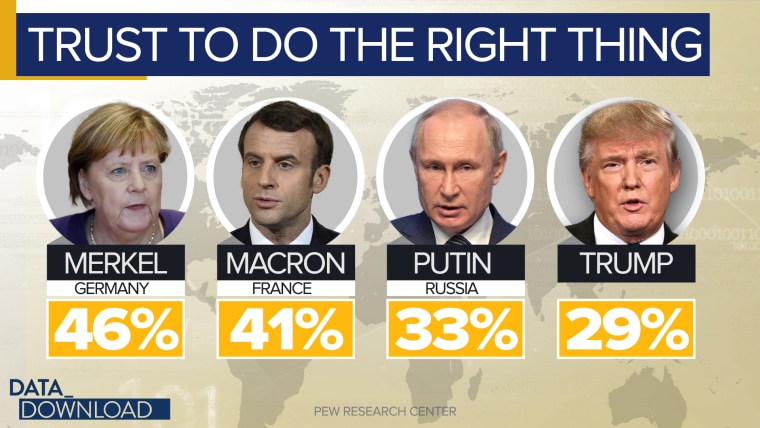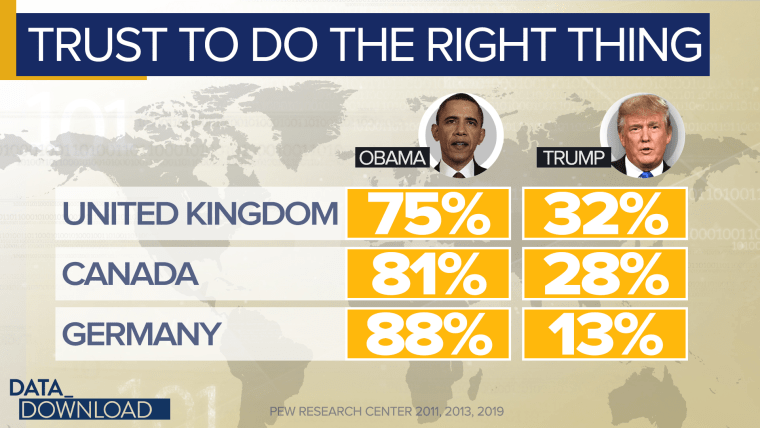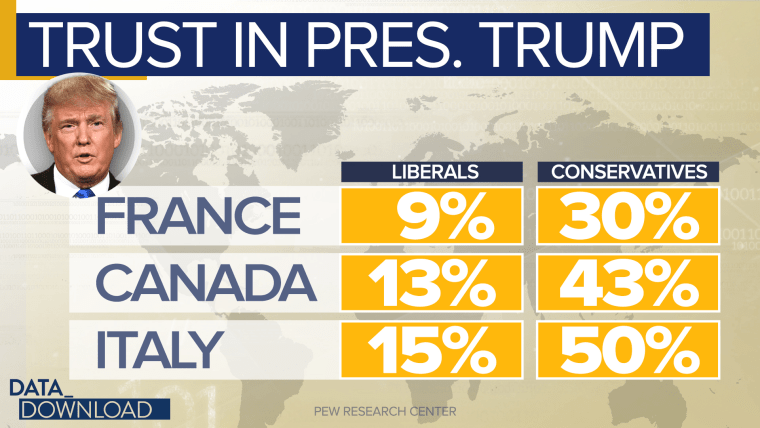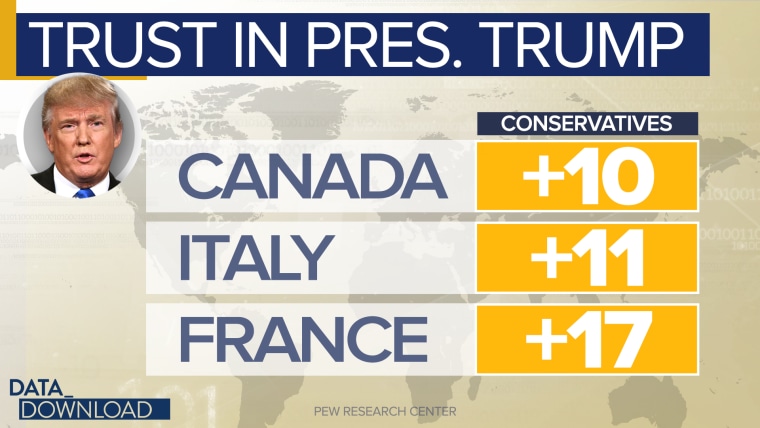WASHINGTON — From missile strikes in the Middle East to tariff fights in Asia, the last few weeks have been a reminder of the outsized role the United States has on the world stage — militarily, culturally and economically. And outside U.S. borders, Donald Trump's presidency is not getting high marks, according to new data from the Pew Research Center.
Overall, the message in the numbers is clear: Most countries do not have a great deal of faith in Trump when it comes to managing international relations, particularly compared to other world leaders. When people from different countries were asked whether they had confidence in various national leaders to "do the right thing regarding world affairs," Trump did not fare well.

To be fair, no world leader scored above 50 percent on the question, using an international median score. Germany's Angela Merkel came closest, at 46 percent. France's Emmanuel Macron ranked just behind her, with 41 percent expressing confidence in him. A third of all respondents, 33 percent, said Vladimir Putin would do the right thing.
Just 29 percent said the same of Trump, less than those three world leaders and just ahead of China's Xi Jinping; 28 percent of respondents had confidence in the Chinese leader to do the right thing.
The data also suggests that any lack of trust is less about the United States than it is about Trump specifically. The president's numbers are noticeably lower on the confidence question than were the figures for his predecessor, Barack Obama, at a similar point in Obama's presidency.

Those are some very big negative moves on that list, particularly among some of the nation's closest allies. In the United Kingdom, Trump’s “right thing” number, 32 percent, is 43 points lower than Obama’s was in 2011. In Canada, Trump’s score, 28 percent, is 53 points lower than Obama’s was in 2013. In France, the confidence is Trump is 64 points lower than it was for Obama in 2011. And in Germany, only 13 percent have confidence in Trump to do the right thing. That is 75 points lower than the 88 percent who had confidence in Obama in 2011.
But the big slides in confidence look a bit different when you consider the ideological leanings of people in countries around the world. Those on the right side of the political spectrum have a lot more confidence in Trump than those on the left.

Some of those splits and Trump’s relative advantage among conservatives are noteworthy. In France, there’s a 21-point difference in the “right thing” question between those on the left and the right. It's a 30-point gap in Canada. The difference is 35 points in Italy. In Israel, it is a whopping 49 points; 86 percent of conservatives there trust Trump to do the right thing, while 37 percent of those on the left feel that way.
And the Pew data show conservatives’ confidence in Trump is climbing in some of those same countries.

In France, conservative confidence in Trump to do the right thing has climbed 17 points in the last year, to 30 percent. Canada has seen conservative faith in Trump to “do the right thing” climb by 10 points, to 43 percent. In Italy, confidence in Trump has grown by 11 points among conservatives, up to 50 percent. And in Poland, confidence in Trump to do the right thing has grown by 13 points among conservatives, up to 61 percent.
In other words, these numbers indicate that Trump may not be especially loved or trusted outside the United States, but there are pockets of support for the president and they are growing. And around the world, the last few years have seen the rise of populist movements and leaders, from Brazil to Italy, espousing views similar to Trump’s and aiming to make their countries "great again."
That's something Republicans and Democrats should keep in mind as 2020 begins.
In both parties, some wonder whether Trump is an aberration (a one-in-a-million shot) or the start of a new kind of politics. Trump's election was unexpected and the White House has never had an occupant like him. But the numbers here suggest that, at the very least, the forces behind "Trumpism" are much bigger than the man in the White House. They span the globe and they may be unlikely to disappear when he is no longer dominating the world stage.